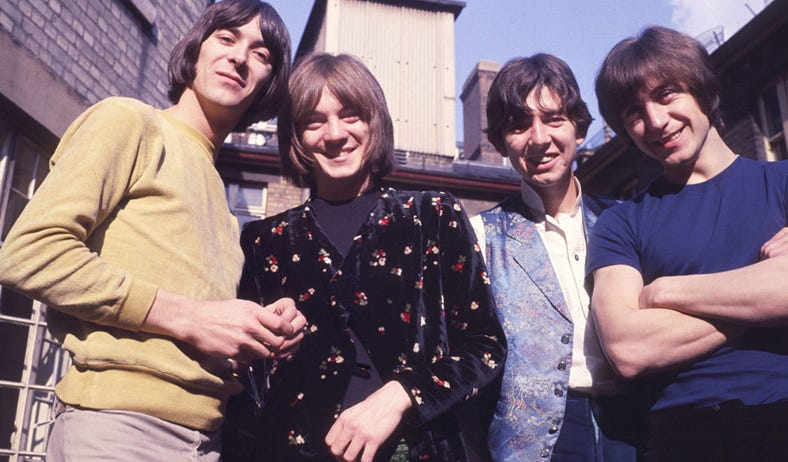The Small Faces
The Small Faces were a British rock band that emerged in the mid-1960s and played a significant role in the mod and psychedelic music scenes of the era.
The band had a relatively short but impactful career, with a series of hit singles and albums that left a lasting influence on the British rock music landscape. Here's a detailed history of The Small Faces:
Formation and Early Years (1965):
- The Small Faces were formed in London in 1965, and the original lineup included Steve Marriott (vocals and guitar), Ronnie Lane (bass guitar), Kenney Jones (drums), and Jimmy Winston (keyboards).
- The band's name, "Small Faces," was inspired by the members' relatively small physical stature, and it was a tongue-in-cheek reference to their youth.
Early Success and Departure of Jimmy Winston (1965-1966):
- The Small Faces quickly gained popularity with their energetic and R&B-influenced live performances.
- Their debut single, "Whatcha Gonna Do About It," released in 1965, reached the UK Top 20, marking their first chart success.
- In 1966, Jimmy Winston was replaced by Ian McLagan as the band's keyboardist. The group's classic lineup was now in place.
Hits and Mod Culture (1966-1967):
- The Small Faces' music became associated with the mod subculture, and their fashion sense and sound resonated with the mod movement of the 1960s.
- They scored a series of hit singles, including "Sha-La-La-La-Lee," "All or Nothing," and "My Mind's Eye."
- Their 1966 album, "Small Faces," featured some of their most iconic tracks and further solidified their reputation as one of the leading bands in the UK.
Change in Sound and "Ogdens' Nut Gone Flake" (1967-1968):
- In 1967, The Small Faces began experimenting with a more psychedelic and whimsical sound, which was evident in tracks like "Itchycoo Park," notable for its use of phasing effects.
- The band's concept album, "Ogdens' Nut Gone Flake" (1968), marked a shift in their musical direction and was highly regarded for its innovative cover design, which resembled a tobacco tin.
- The album featured a mix of rock, soul, and psychedelia, including the hit "Lazy Sunday."
The End of The Small Faces (1968):
- The Small Faces faced internal tensions, particularly between Steve Marriott and the other members. Marriott's dominant role in the band led to creative conflicts.
- In 1969, Marriott left the band to form Humble Pie, a move that effectively ended the Small Faces. Their last single, "Afterglow (Of Your Love)," was released during this time.
Legacy and Influence:
- While their active years as a band were relatively short, The Small Faces left an enduring legacy in British rock music.
- They were pioneers of the mod and psychedelic rock genres, influencing subsequent generations of musicians and bands.
- The remaining members of the Small Faces, along with vocalist Rod Stewart and guitarist Ronnie Wood, went on to form the band Faces, which achieved international success in the early 1970s.
- Their music continues to be celebrated, and The Small Faces are remembered as one of the most influential and beloved bands of the 1960s.
In summary, The Small Faces were a short-lived but influential British rock band that played a pivotal role in the mod and psychedelic music scenes of the 1960s. Their music and style resonated with the youth culture of the era, leaving an indelible mark on the history of British rock music.
